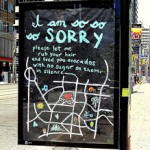Apologize – it’ll do you both good. The King’s Speech.
In our quest for self-importance, we can lose sight of our “messes.” The exploitative mindset has leached into society, blanketing our psyches with inappropriate ways of viewing peers. When we trample those around us, the respectful course of action is to make amends. “If you’ve done something wrong in your dealing with another person, it’s as if there’s an infection in your relationship.” According to Pausch, an apology should consist of the following three phrases:
- What I did was wrong
- I feel badly that I hurt you
- What can I do to make this better?
If the matter remains unresolved it festers, and negatively impacts future interaction. Conversely, if someone meets you halfway you need to extend for their reach. I witnessed a small child picking her scab. We do this (metaphorically) when we obsessively focus on what was done to us, despite attempts at reconciliation. Continual picking causes the situation to expand; it creates a relational pustule where none was present. People become so wedded to their self-righteous scenarios that they preclude the other party from presenting their side. Martha Ringer encourages us to “Practice forgiveness [both of ourselves and others] so we are always complete and up-to-date.”
In an obsessive mind, everything assumes mammoth proportions. Rifts occur when we choose not to forgive, refuse another’s apology, and when we use irrational negative thinking in either of the aforementioned scenarios. Consciously monitoring our thoughts suggests we’re responsible for the output.If a colleague arrives with their hat in their hand, the humane thing to do is invite them to dine. Bullies sit with their figurative baseball bat waiting to beat you to a pulp.
When a mea culpa is proffered, our first instinct should be to graciously accept the gesture (and to acknowledge our part in the wrong doing). Emotional intelligence dictates that if the other party gives a little, then you should bend as well. Giving someone a lecture (or rubbing their nose in the offense) negates healing, and keeps you stuck in first gear. Lay down your arms, and embrace a person you formerly considered a foe. The resulting union will be a reflection of the unbroken whole.





Recent Comments